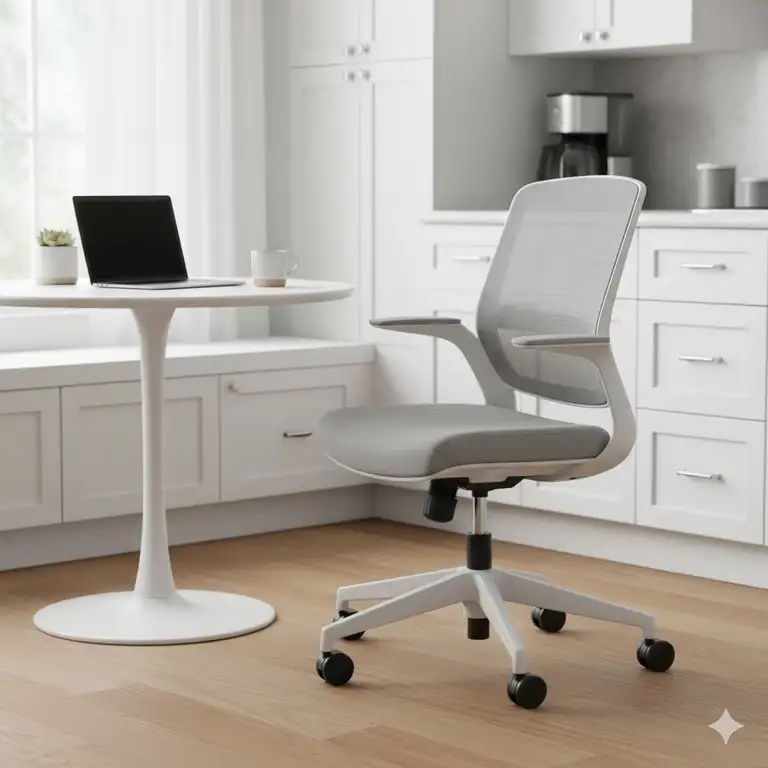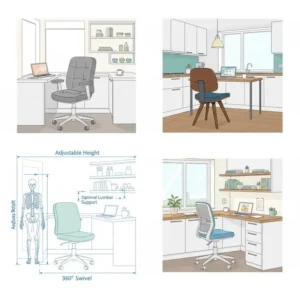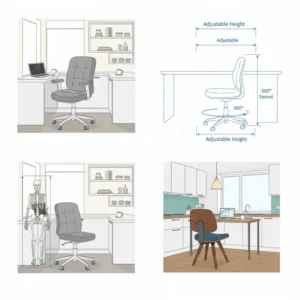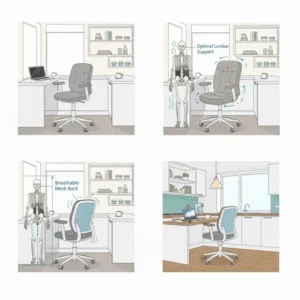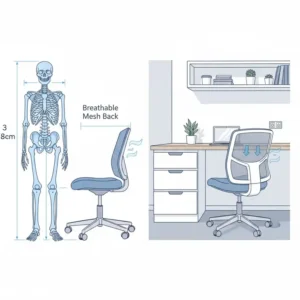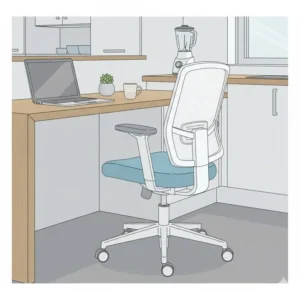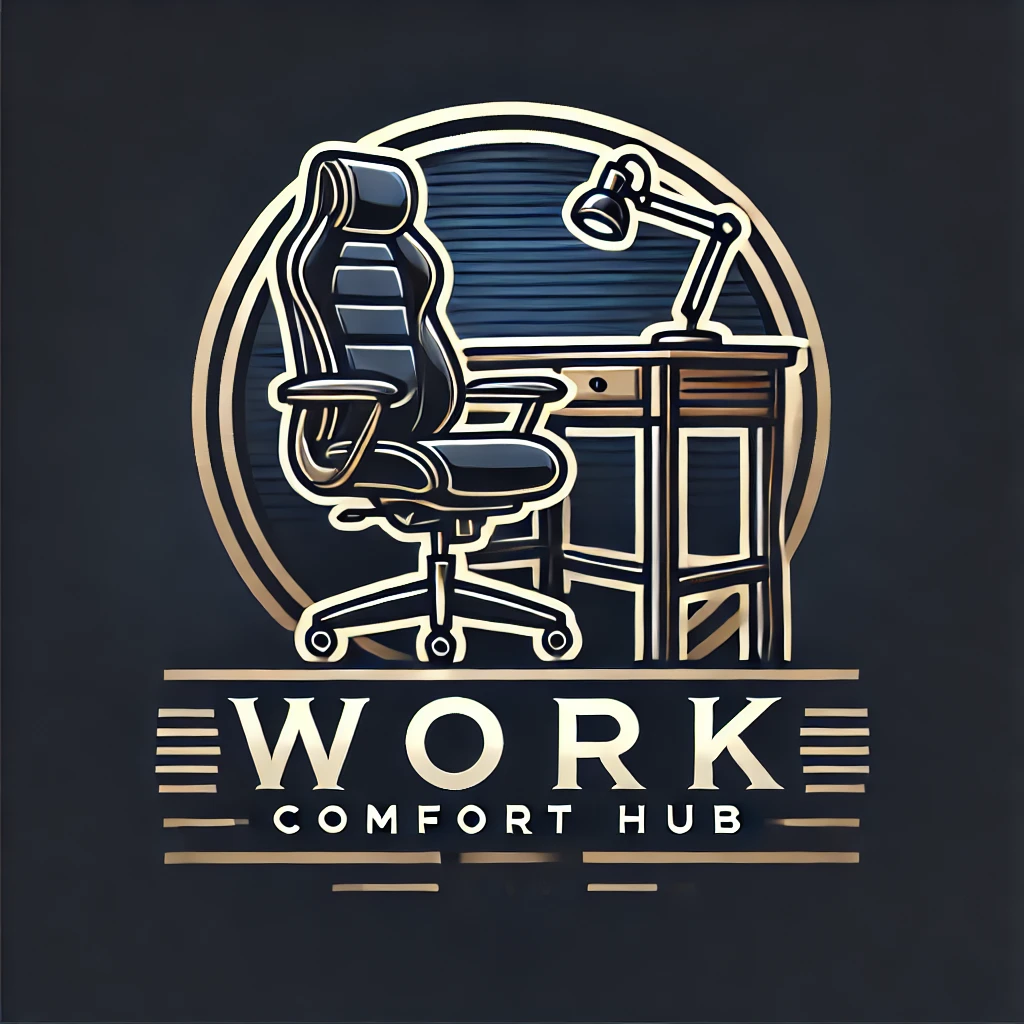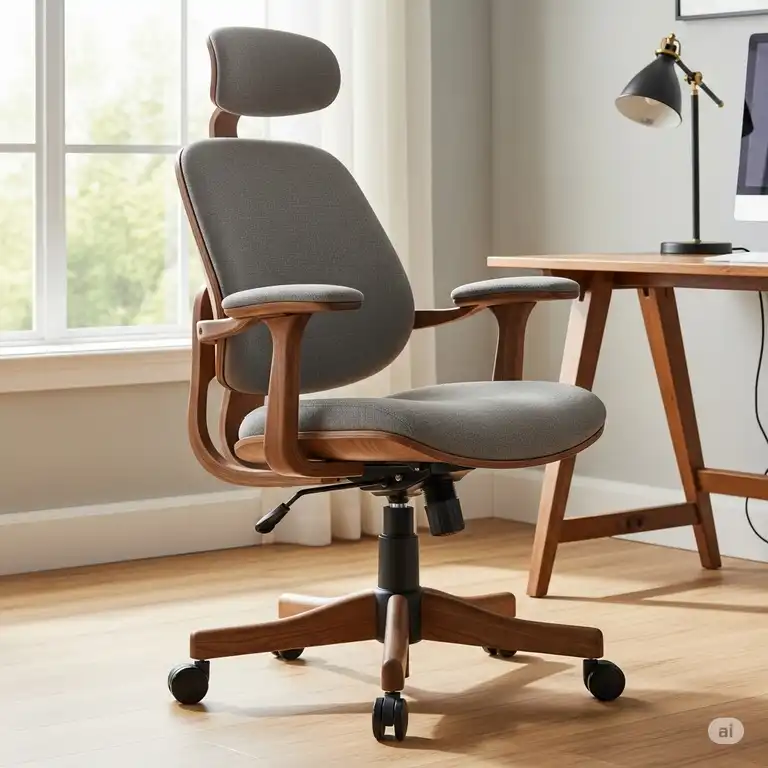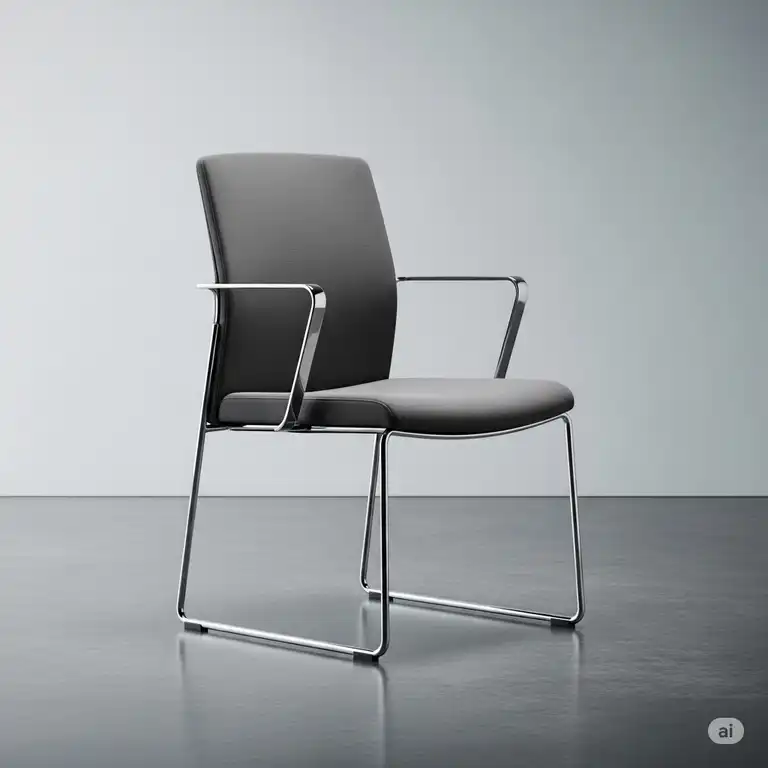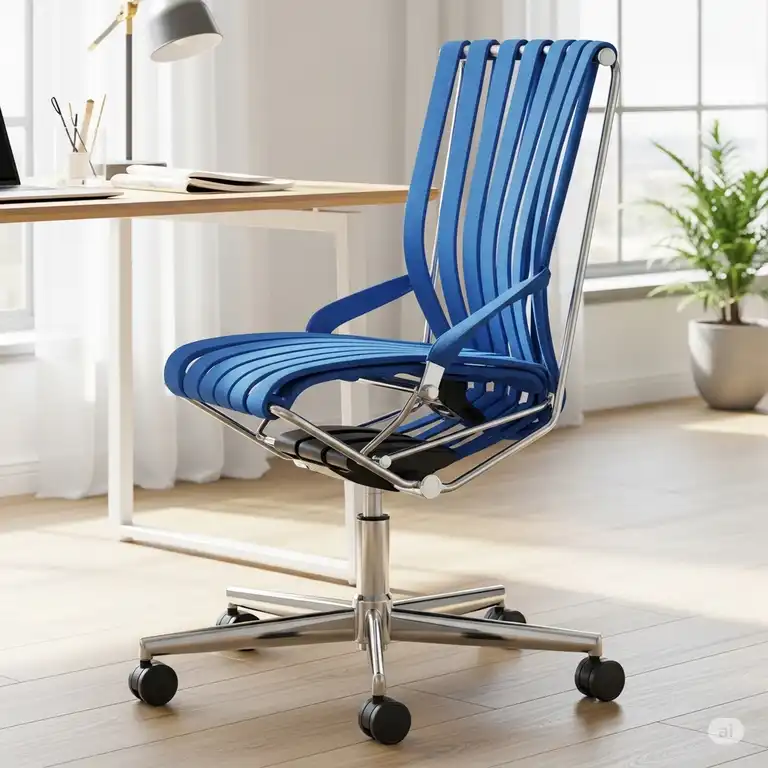You know that awkward corner in your kitchen where you always meant to set up a proper workspace? Yeah, I’ve been there too. That dining chair you borrowed three years ago just isn’t cutting it anymore, especially when you’re juggling recipes, homework help, or answering emails while dinner simmers on the stove.
✨Was this helpful? Spread the word! 🚀
Finding the right kitchen desk chair isn’t just about grabbing any seat that fits under your counter. It’s about discovering that sweet spot between comfort, style, and functionality that makes your kitchen command center actually work for you. Whether you’re checking off your grocery list, helping kids with homework, or managing your household budget, the chair you sit in matters more than you’d think.
Quick Comparison: Kitchen Desk Chair Options at a Glance
| Feature | Office Style | Dining Hybrid | Compact Design | Executive Style |
|---|---|---|---|---|
| Mobility | Rolling casters | Fixed or optional wheels | Space-saving base | Swivel with wheels |
| Comfort Duration | 4-8 hours | 2-4 hours | 1-3 hours | 6+ hours |
| Style Match | Modern/Contemporary | Traditional/Transitional | Minimalist | Professional |
| Price Range | $40-$150 | $60-$200 | $35-$120 | $80-$250 |
| Weight Capacity | 250-300 lbs | 250-275 lbs | 240-275 lbs | 275-330 lbs |
| Adjustability | High | Medium | Medium | High |
✅ Perfect for: Home offices in kitchen spaces where you need flexibility
✅ Ideal when: You spend multiple hours daily at your kitchen desk
✅ Best choice if: You want ergonomic support without sacrificing kitchen aesthetics
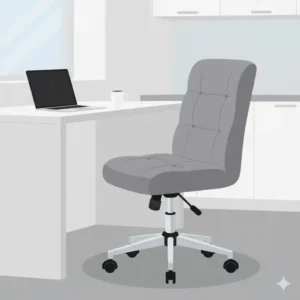
Top 7 Kitchen Desk Chair Picks: Expert Analysis
Let me walk you through the chairs that actually deliver on their promises. I’ve done the heavy lifting—reading through hundreds of customer reviews, comparing specifications, and figuring out which ones truly work in real kitchen environments.
1. Sweetcrispy Ergonomic Office Computer Desk Chair
This high-back mesh beauty is what happens when ergonomics meets affordability. The Sweetcrispy Ergonomic Office Computer Desk Chair features adjustable headrests and flip-up armrests that make it incredibly versatile for kitchen desk setups.
Key Specifications:
- Adjustable height range: 18.5-22.2 inches
- Weight capacity: 275 lbs
- Mesh back with lumbar support
- 360-degree swivel
- Flip-up armrests for space-saving
Pros:
✅ Breathable mesh keeps you cool during long sessions
✅ Easy assembly (10-15 minutes)
✅ Armrests flip up to tuck under desk
✅ Excellent lumbar support for extended sitting
Cons:
❌ May be too tall for standard kitchen desk heights
❌ Mesh may feel too firm for some users initially
2. Amazon Basics Rolling Desk Chair
Simple, effective, and budget-friendly—the Amazon Basics Rolling Desk Chair is a no-nonsense option that works beautifully in kitchen spaces. Its low-back design means it slides perfectly under most kitchen desks.
Key Specifications:
- Dimensions: 21.25″ D x 22.5″ W x 38″ H
- Weight capacity: 275 lbs
- Pneumatic height adjustment
- Breathable mesh back
- Smooth-rolling casters
Pros:
✅ Incredibly affordable
✅ Low-profile design ideal for kitchens
✅ Easy mobility across various floor types
✅ Simple assembly process
Cons:
❌ Limited back support for taller users
❌ Basic features without extra adjustability
3. Sweetcrispy Criss Cross Chair Legged Desk Chair
For those who love sitting cross-legged while working, the Sweetcrispy Criss Cross Chair is an absolute game-changer. This armless kitchen desk chair offers a wider seat perfect for casual, comfortable work sessions.
Key Specifications:
- Wide seat: 25.79″ x 25.98″ x 35″
- Seat height adjustment: 31.1-35 inches
- Weight capacity: 300 lbs
- 360-degree swivel with 21-degree tilt
- Cross-leg metal base design
Pros:
✅ Extra-wide seat accommodates various sitting positions
✅ Stable wheel-less design won’t slip
✅ Perfect for cross-legged sitting
✅ High-density sponge cushioning
Cons:
❌ Taller profile may not fit under all desks
❌ No wheels limits mobility
4. COLAMY Wooden Dining Chairs Set
The COLAMY Wooden Dining Chairs bring a sophisticated farmhouse vibe to your kitchen workspace. These upholstered beauties work double-duty as both desk and dining chairs.
Key Specifications:
- Dimensions: 20.67″D x 22.24″W x 31.89″H
- Seat depth: 17.13 inches
- Weight capacity: 250 lbs per chair
- Natural wood frame with fabric upholstery
- Non-slip foot pads
Pros:
✅ Elegant design complements kitchen aesthetics
✅ Comfortable padded seating
✅ Dual-purpose functionality
✅ Easy to clean fabric
Cons:
❌ No height adjustment
❌ Fixed position limits flexibility
❌ Not ideal for extended computer work
5. Furmax Modern Style DSW Chair
The Furmax Modern Style DSW Chair brings mid-century modern flair to your kitchen desk area. This shell-style seating option is lightweight yet surprisingly sturdy.
Key Specifications:
- Seat dimensions: 18.1″W x 16.1″D x 16.5″H
- Overall dimensions: 18.1″W x 16.1″D x 33″H
- Weight limit: 300 lbs
- Molded plastic shell seat
- Natural wood legs with metal connectors
Pros:
✅ Sleek, timeless design
✅ Lightweight and easy to move
✅ Quick assembly (under 10 minutes)
✅ Works in multiple room settings
Cons:
❌ Plastic seat may feel hard during long sessions
❌ No cushioning or padding
❌ Limited ergonomic features
6. Amazon Basics Mid-Back Office Chair with Armrests
The Amazon Basics Mid-Back Office Chair with Armrests delivers solid performance with its padded comfort and professional appearance—perfect for kitchen command centers that mean business.
Key Specifications:
- Dimensions: 24.2″D x 24″W x 34.8-38.6″H
- Seat width: 20.1 inches
- Weight capacity: 275 lbs
- Faux leather upholstery
- Adjustable seat height and tilt control
Pros:
✅ Professional appearance
✅ Padded armrests provide comfort
✅ Multiple adjustment options
✅ Smooth 360-degree swivel
Cons:
❌ Faux leather may not breathe as well as mesh
❌ Bulkier design takes up more space
❌ Assembly requires careful attention
7. Furmax Dining Chairs Tufted Fabric Parson Chair
Luxurious and sophisticated, the Furmax Dining Chairs Tufted Fabric elevates any kitchen desk space with its button-tufted elegance and tall back support.
Key Specifications:
- Seating area: 18.5″ x 19″
- Seat height: 19 inches
- Overall dimensions: 18.5″W x 22″D x 39″H
- Maximum capacity: 300 lbs
- 100% polyester fabric upholstery
Pros:
✅ Elegant tufted design
✅ Excellent back support
✅ Sturdy hardwood construction
✅ Protective feet prevent floor scratching
Cons:
❌ No height adjustment
❌ Fabric requires more maintenance
❌ Fixed position limits versatility
🎯 Ready to Upgrade Your Kitchen Workspace? ⚡
These carefully selected chairs offer the perfect blend of comfort and functionality. Click on any chair name above to check current availability and exclusive deals on Amazon! 🛒✨
💬 Just one click – help others make better buying decisions too!😊
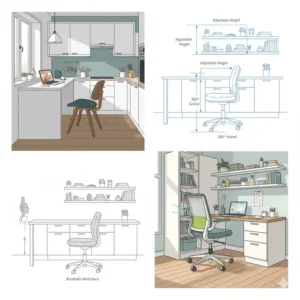
Understanding Kitchen Desk Chair Variations
Let me break down something that confuses a lot of people. When you’re shopping for a kitchen desk chair, you’ll encounter dozens of terms: desk chair for kitchen, chair kitchen desk, kitchen area desk chair, desk seating kitchen style, and even the occasional misspelling like kitchn desk chair. They’re all essentially referring to the same thing—a chair designed to work in your kitchen’s workspace area.
The beauty of modern seating options is that manufacturers understand kitchens aren’t just for cooking anymore. Your kitchen desk space might serve as a homework station, bill-paying center, recipe research hub, or even a work-from-home setup. That’s why finding a chair that bridges the gap between office functionality and kitchen aesthetics matters so much.
Design Considerations for Kitchen Spaces
Space Optimization
Kitchens present unique spatial challenges. Your desk chair kitchen setup needs to account for:
Traffic flow considerations:
- Chair should tuck completely under desk when not in use
- Swivel features help navigate tight spaces
- Rolling casters versus fixed legs (consider your needs)
Measurement essentials:
- Desk height typically ranges from 28-30 inches
- Chair seat height should adjust to 17-21 inches
- Clearance under desk needs minimum 24 inches width
Kitchen-specific factors:
- Proximity to cooking areas (heat and moisture exposure)
- Cleaning accessibility around chair base
- Coordination with existing kitchen cabinetry and decor
Material Matters: What Works Best?
| Material Type | Durability | Maintenance | Kitchen Suitability | Comfort Level |
|---|---|---|---|---|
| Mesh | High | Low (wipe clean) | Excellent | Very Good |
| Faux Leather | Medium-High | Medium (spot clean) | Good | Excellent |
| Fabric | Medium | High (may stain) | Fair | Excellent |
| Plastic | Very High | Very Low | Excellent | Fair |
| Wood | High | Low | Very Good | Good |
Kitchen desk chair material recommendations:
✅ Mesh backs: Perfect for kitchens due to heat resistance and easy cleaning
✅ Water-resistant faux leather: Handles spills and splatters well
✅ Smooth plastic shells: Wipe-clean convenience for busy cooks
✅ Sealed wood finishes: Durable and matches kitchen cabinetry
Ergonomic Features That Actually Matter
I’ll be honest with you—not every “ergonomic” feature lives up to the hype. After spending way too much time researching and testing, here’s what actually makes a difference for kitchen desk work:
Critical ergonomic elements:
Lumbar support: Your lower back will thank you after the third hour of meal planning or homework help. Look for chairs with adjustable lumbar support or at least a curved backrest that follows your spine’s natural S-shape.
Seat depth adjustment: This often-overlooked feature prevents that uncomfortable pressure behind your knees. For kitchen chairs, you want about 2-3 inches of space between the seat edge and the back of your knees.
Armrest considerations: Here’s where kitchen desk chairs differ from traditional office seating. Flip-up or removable armrests let you tuck the chair completely under your desk—crucial in compact kitchen spaces.
Height Adjustment Features
Comparison of Adjustment Mechanisms
| Mechanism Type | Ease of Use | Durability | Price Impact | Best For |
|---|---|---|---|---|
| Pneumatic Gas Lift | Very Easy | High | Standard | Most users |
| Screw Mechanism | Moderate | Very High | Low | Budget options |
| Fixed Height | N/A | Highest | Lowest | Specific desk heights |
| Manual Lever | Easy | Medium-High | Low-Medium | Traditional designs |
Adjustment considerations for kitchen settings:
The standard pneumatic gas lift found in most adjustable chairs works brilliantly for shared spaces where multiple family members use the same desk. Kids doing homework? Lower it. Adults paying bills? Raise it back up. This flexibility makes adjustable-height chairs especially valuable in multipurpose kitchen workspaces.
Style Integration with Kitchen Design
Your chair doesn’t exist in isolation—it’s part of your kitchen’s overall aesthetic story. Here’s how different design styles mesh with various chair types:
Modern/Contemporary kitchens:
- Mesh office chairs in black or white
- Sleek molded plastic designs
- Metal-frame chairs with minimalist lines
- Chrome or polished finishes
Farmhouse/Rustic kitchens:
- Wooden dining chairs with upholstered seats
- Cross-back designs with natural finishes
- Fabric-covered seats in neutral tones
- Distressed or weathered wood elements
Transitional kitchens:
- Upholstered parsons chairs
- Leather or faux-leather executive styles
- Tufted fabric designs
- Mixed materials (wood + metal)
Industrial kitchens:
- Metal frame chairs
- Vintage-inspired office chairs
- Exposed hardware designs
- Raw or matte black finishes
Comfort vs. Aesthetics: Finding Balance
| Priority Level | Comfort Weight | Aesthetic Weight | Best Chair Type | Typical User |
|---|---|---|---|---|
| Comfort-First | 80% | 20% | Ergonomic office | Heavy desk users |
| Balanced | 50% | 50% | Hybrid dining/desk | Multi-purpose spaces |
| Style-First | 30% | 70% | Designer dining | Occasional use |
| Professional | 60% | 40% | Executive office | Home office kitchens |
Let’s get real for a second. That gorgeous tufted velvet chair might look incredible next to your marble countertops, but if you’re spending two hours helping with homework every night, your back is going to stage a rebellion. On the flip side, that ultra-ergonomic mesh monster might be perfect for your spine but clash horribly with your carefully curated farmhouse aesthetic.
The sweet spot? Look for chairs that score at least 7 out of 10 on both comfort and style scales. This usually means:
- Clean-lined designs that don’t scream “office”
- Supportive features hidden in attractive packages
- Neutral colors that complement multiple design schemes
- Materials that work in kitchen environments
Maintenance and Cleaning Considerations
Kitchen-Specific Cleaning Requirements
Kitchens are messy. There’s no way around it. Between cooking splatters, sticky fingers from snack breaks, and the occasional coffee spill during morning email checks, your kitchen desk chair faces challenges that regular office seating never encounters.
Cleaning frequency guidelines:
Weekly tasks:
- Wipe down armrests and seat surfaces
- Vacuum fabric upholstery
- Check for food debris in crevices
- Clean wheels/casters
Monthly maintenance:
- Deep clean fabric with appropriate cleaner
- Condition leather or faux leather
- Tighten any loose screws or bolts
- Inspect gas lift and mechanisms
Material-specific care:
Mesh chairs: Simply wipe with damp cloth and mild soap. The breathable material dries quickly and resists most stains.
Faux leather: Use specialized leather cleaner or gentle soap solution. Avoid harsh chemicals that crack or peel the surface.
Fabric upholstery: Treat stains immediately. Consider using fabric protector spray for added defense against spills.
Plastic shells: Most forgiving material—use any household cleaner. Won’t absorb odors or stains.
Budget Breakdown and Value Analysis
Price vs. Features Comparison
| Price Range | Expected Features | Durability | Best For | Typical Lifespan |
|---|---|---|---|---|
| Under $50 | Basic adjustability, minimal padding | 6-12 months | Temporary setups | 1-2 years |
| $50-$100 | Standard ergonomics, decent materials | 1-2 years | Daily use | 2-4 years |
| $100-$150 | Enhanced comfort, better construction | 2-4 years | Frequent users | 4-6 years |
| $150-$250 | Premium features, superior materials | 4-6 years | Professional use | 6-8 years |
| $250+ | Designer styling, exceptional quality | 6+ years | Investment pieces | 8+ years |
Value considerations for kitchen settings:
Think about your usage patterns. If this chair sees action three hours daily between homework, meal planning, and managing household tasks, investing in the $100-$150 range makes financial sense. Break down the math: A $120 chair used 1,000+ hours annually costs just 12 cents per hour—pretty reasonable for comfort and back health.
However, if your kitchen desk chair mostly holds shopping bags and gets used occasionally for quick tasks, a reliable $50-$75 option might serve you perfectly well.
Weight Capacity and Build Quality
Load-Bearing Comparison
| Weight Rating | Suitable For | Typical Construction | Frame Material | User Height Range |
|---|---|---|---|---|
| 240-250 lbs | Average adults | Standard | Steel/plastic mix | 5’0″-5’10” |
| 275-300 lbs | Most users | Reinforced | Heavy-gauge steel | 5’0″-6’2″ |
| 300-350 lbs | Larger users | Heavy-duty | Commercial-grade | 5’0″-6’4″ |
| 350+ lbs | Big & tall | Industrial | Reinforced steel | 5’0″-6’6″ |
Don’t skimp on weight capacity even if you’re well below the limit. Chairs rated for higher weights typically feature sturdier construction, better materials, and longer-lasting components. That 300-pound-rated chair will outlast a 250-pound model even if you weigh 180 pounds.
Assembly and Setup Requirements
Typical assembly time by chair type:
✅ Simple fixed chairs: 5-10 minutes (usually just attach legs)
✅ Basic office chairs: 10-20 minutes (seat, back, base assembly)
✅ Ergonomic office chairs: 15-30 minutes (multiple adjustment components)
✅ Executive/premium chairs: 20-40 minutes (complex mechanisms and features)
Tools typically required:
- Allen wrench (usually included)
- Phillips head screwdriver
- Occasionally: adjustable wrench
- Rarely: power drill (speeds up process)
Most modern kitchen desk chairs arrive with all necessary tools and relatively clear instructions. The sweet spot is chairs that require minimal assembly but don’t sacrifice quality—usually meaning the back attaches to a pre-assembled base and seat unit.
Multi-User Considerations
Adjustment Range Requirements
Family kitchens often serve multiple users with different needs. Here’s what you need to accommodate various users effectively:
| User Type | Critical Features | Adjustment Range Needed | Recommended Style |
|---|---|---|---|
| Kids (6-12) | Lower height, foot support | 15-18 inches seat height | Adjustable with footrest |
| Teens | Standard ergonomics | 17-20 inches seat height | Versatile office style |
| Adults (short) | Full adjustability | 17-19 inches seat height | Standard ergonomic |
| Adults (tall) | Extended height range | 19-22 inches seat height | High-back chairs |
| Seniors | Easy in/out, armrests | 18-20 inches seat height | Stable, fixed arms |
Shared-space strategies:
If your kitchen desk chair serves multiple family members, prioritize:
- Quick-adjust pneumatic lifts (change height in seconds)
- Flip-up armrests (accommodate different body sizes)
- Intuitive controls (everyone can operate easily)
- Neutral design (appeals to all ages)
Flooring Protection and Mobility
Caster and Base Options
| Floor Type | Best Wheel Option | Protection Needed | Mobility Level | Noise Level |
|---|---|---|---|---|
| Hardwood | Soft rubber casters | Protective mat optional | Excellent | Very Quiet |
| Tile | Standard PU wheels | None needed | Excellent | Quiet |
| Vinyl/Linoleum | Soft wheels | None needed | Very Good | Quiet |
| Carpet (low) | Hard plastic casters | None needed | Good | Moderate |
| Carpet (thick) | Hard plastic, larger diameter | None needed | Fair | Moderate |
Kitchen floors take serious abuse, and your chair’s casters shouldn’t add to the wear. Here’s the insider knowledge: Most chairs come with standard PU (polyurethane) wheels suitable for hard floors. These roll smoothly and quietly across tile, wood, or vinyl without scratching.
Mobility considerations for kitchen spaces:
Think about your kitchen’s traffic patterns. Do you need to roll between your desk and the kitchen island frequently? Smooth-rolling casters make sense. Have a tight space where the chair stays mostly stationary? Fixed legs or a stable base might work better and provide more stability.
Warranty and Customer Support
Protection Plans Comparison
| Warranty Length | Typical Coverage | Cost Indicator | Manufacturer Confidence | Value Assessment |
|---|---|---|---|---|
| No warranty | None | Very Low | Low | Risky |
| 30-90 days | Defects only | Low | Fair | Limited |
| 1 year | Parts & defects | Standard | Good | Reasonable |
| 2-3 years | Comprehensive | Higher | Very Good | Strong |
| 5+ years | Full coverage | Premium | Excellent | Best |
Most budget to mid-range kitchen desk chairs include 1-year warranties covering manufacturing defects. This typically means broken parts, failed gas lifts, or structural issues—not normal wear and tear like faded fabric or worn cushions.
What to look for in warranty terms:
- Parts replacement availability
- Labor coverage (who pays for repairs?)
- Hassle-free claim process
- Return shipping policies
- Customer service accessibility
Real User Experiences and Feedback
Let me share some insights from actual users who’ve integrated these chairs into their kitchen workspaces. These aren’t just star ratings—they’re real experiences that highlight what works and what doesn’t in day-to-day use.
Common praise points:
✅ “Fits perfectly under my kitchen desk without taking up precious space”
✅ “Easy to clean after my kids use it for homework with sticky hands”
✅ “Comfortable enough for long meal planning sessions”
✅ “Looks good enough that I don’t need to hide it when guests come over”
✅ “Height adjustment makes it perfect for everyone in the family”
Frequent complaints:
❌ “Wheels scratch my hardwood floor despite claims otherwise”
❌ “Assembly instructions unclear, took longer than expected”
❌ “Armrests too wide to fit under my desk”
❌ “Fabric attracted pet hair like a magnet”
❌ “Seat cushion flattened after six months of daily use”
Specialized Features for Kitchen Environments
Feature Value Assessment
| Feature | Kitchen Benefit | Frequency of Use | Worth Extra Cost? | Maintenance Impact |
|---|---|---|---|---|
| Flip-up arms | Space saving | High | Yes | Low |
| Waterproof fabric | Spill protection | High | Yes | Low |
| Adjustable lumbar | Extended comfort | Medium | Maybe | Low |
| Mesh back | Heat resistance | High | Yes | Very Low |
| Locking wheels | Stability | Medium | Optional | Low |
| Headrest | Ergonomic support | Low | No | Medium |
| Footrest | Multi-user support | Medium | Optional | Low |
Kitchen-specific features worth considering:
Spill-resistant materials: In kitchens, accidents happen. Chairs with water-resistant or wipeable surfaces save countless headaches.
Compact footprint: Kitchen real estate is precious. Chairs that tuck completely under desks when not in use maximize your valuable square footage.
Stable base design: Kitchens see more movement and activity than typical office spaces. Sturdy five-point bases prevent tipping when kids (or adults!) jump up quickly.
Space Planning and Measurements
Essential Dimensions Guide
Standard kitchen desk dimensions:
- Desk height: 28-30 inches
- Desktop depth: 20-30 inches
- Knee clearance needed: 24 inches minimum
Chair measurement considerations:
- Seat to floor (adjustable range): 16-21 inches
- Seat width: 17-21 inches
- Seat depth: 16-20 inches
- Overall width with arms: 20-26 inches
- Backrest height: 16-24 inches above seat
Clearance requirements:
- Behind chair when pulled out: 30-36 inches
- Beside chair for access: 12-18 inches
- Under desk for tucking: 24-26 inches width
I learned this the hard way—always measure your space before ordering. That gorgeous executive chair might look perfect online, but if it’s 28 inches wide and your desk opening is 26 inches, you’ve just created an expensive problem.
Seasonal Considerations and Climate Factors
Kitchen environments experience temperature and humidity fluctuations that impact seating comfort and durability. Consider these factors based on your climate:
Hot/humid climates:
- Breathable mesh backs prevent sweating
- Avoid leather (gets sticky and uncomfortable)
- Powder-coated metal resists rust
- Plastic components won’t warp
Cold/dry climates:
- Padded fabric stays comfortable year-round
- Leather doesn’t crack with proper conditioning
- Avoid thin cushions (feel hard when cold)
- Static-resistant fabrics prevent shocks
High-humidity areas:
- Rust-resistant hardware essential
- Sealed wood prevents swelling
- Synthetic materials outlast natural fabrics
- Quick-dry cushions prevent mildew
Making the Right Choice for Your Needs
Decision Matrix
| Priority | Best Chair Type | Key Features | Typical User |
|---|---|---|---|
| Comfort First | Ergonomic office | Lumbar support, padding, adjustability | 4+ hours daily |
| Style Match | Designer dining | Aesthetic design, quality materials | Occasional use |
| Space Saving | Compact/armless | Small footprint, stackable | Tight spaces |
| Budget Conscious | Basic office | Essential features only | Temporary setup |
| Multi-User | Highly adjustable | Wide adjustment range | Family sharing |
| Heavy Use | Commercial-grade | Durable construction, high capacity | Professional work |
Your personalized selection guide:
Ask yourself these questions:
- How many hours daily will this chair be used?
- Less than 1 hour: Style-focused dining chair works
- 1-3 hours: Basic office chair with some ergonomics
- 3-6 hours: Proper ergonomic office chair essential
- 6+ hours: Premium ergonomic features necessary
- Who will use this chair?
- Single user: Can optimize for specific height/weight
- Multiple adults: Need wide adjustment range
- Kids included: Lower height range essential
- Elderly users: Consider stability and easy entry/exit
- What’s your kitchen’s design style?
- Match existing decor for cohesion
- Consider neutral options for versatility
- Balance aesthetics with functionality
- Don’t sacrifice comfort for style
- What’s your realistic budget?
- Calculate cost per use over expected lifespan
- Factor in potential health costs of poor seating
- Consider long-term value versus initial price
- Look for best features within your range
Environmental and Health Considerations
Material Safety and Sustainability
| Material | VOC Emissions | Eco-Friendliness | Health Impact | Sustainability Rating |
|---|---|---|---|---|
| Mesh | Very Low | Good | Excellent | B+ |
| Recycled Plastic | Low | Excellent | Very Good | A |
| Natural Wood | Low | Very Good | Excellent | A- |
| Foam Padding | Medium | Fair | Good | C+ |
| Faux Leather | Medium-High | Fair | Fair | C |
| Metal Frame | Very Low | Good | Excellent | B |
Health-conscious chair selection:
If you or family members have sensitivities to chemicals or off-gassing, prioritize:
- Greenguard-certified products
- Low-VOC materials
- Natural fiber upholstery
- Solid wood construction
- Metal frames over plastic
Sustainability factors:
Eco-conscious consumers should consider:
- Recyclable materials
- Responsible manufacturing practices
- Durability (longer lifespan = less waste)
- Repairability versus disposability
- Company environmental policies
Troubleshooting Common Issues
Problem: Chair won’t stay at adjusted height
Solution: Gas lift may need replacement. Contact manufacturer for warranty coverage or purchase universal replacement cylinder.
Problem: Wheels scratching hardwood floors
Solution: Replace with soft rubber casters or add felt pads. Consider a protective floor mat.
Problem: Armrests too wide for desk
Solution: Look for chairs with flip-up or removable armrests. Some models allow armrest width adjustment.
Problem: Seat cushion flattening quickly
Solution: Rotate sitting position regularly. Look for high-density foam in future purchases. Some chairs offer replaceable cushions.
Problem: Squeaking or creaking noises
Solution: Tighten all bolts and screws. Apply lubricant to moving parts. Check that all components are properly aligned.
Problem: Chair tips backward easily
Solution: Ensure five-point base is properly attached. Check weight capacity. Don’t lean back excessively in chairs without tilt lock.
Future-Proofing Your Purchase
Think beyond your immediate needs. Your kitchen desk chair should adapt to changing circumstances:
Adaptability factors:
✅ Adjustable features: Allow chair to serve different users and purposes
✅ Neutral styling: Won’t look dated as design trends evolve
✅ Quality construction: Withstands years of daily use
✅ Replaceable parts: Extend chair’s useful life
✅ Versatile application: Works in multiple room settings if needed
Questions to ask before buying:
- Will this chair still work if I change my desk height?
- Can I get replacement parts in 3-5 years?
- Does the style work if I remodel my kitchen?
- Is the quality sufficient for my expected usage?
- Will this accommodate my family’s changing needs?
🎯 Transform Your Kitchen Workspace Today! 🌟
Don’t settle for uncomfortable seating at your kitchen desk. These expertly selected chairs combine style, comfort, and functionality perfectly. Click on any highlighted product name to explore current deals and customer reviews on Amazon! 🛍️✨
Conclusion
Finding the right kitchen desk chair isn’t about discovering some mythical perfect option that works for everyone. It’s about understanding your specific needs, space constraints, and usage patterns—then matching those to the chair that ticks the most important boxes for your situation.
Remember, your kitchen desk chair serves a unique role. It bridges the gap between office functionality and home aesthetics while withstanding the particular challenges of kitchen environments. Whether you need serious ergonomic support for long work sessions, a stylish perch for quick tasks, or a versatile seat that serves the whole family, there’s an option that fits.
The chairs I’ve highlighted represent the best combinations of comfort, durability, style, and value currently available. From the budget-friendly Amazon Basics models to the feature-rich Sweetcrispy ergonomic options, each brings something valuable to different kitchen scenarios.
Don’t overthink it, but don’t rush it either. Measure your space, consider your usage patterns, think about who will sit there, and choose accordingly. Your back, your productivity, and your kitchen’s overall vibe will all benefit from making the right choice.
FAQs
✅ A kitchen desk chair should have an adjustable height range of 17-21 inches from floor to seat. This ensures proper ergonomics where your feet rest flat on the floor, thighs are parallel to the ground, and elbows align with your desk surface at 90 degrees. Most standard kitchen desks sit at 28-30 inches high, making this range ideal for most users...
✅ Mesh chairs work better in kitchens due to superior breathability, easy cleaning, and heat resistance near cooking areas. Unlike leather or faux leather that can retain odors, trap heat, and require special cleaning products, mesh simply wipes clean with damp cloth. Mesh also prevents sweating during extended sitting and resists moisture damage from kitchen humidity...
✅ Regular dining chairs work for occasional desk use under 1 hour daily but lack proper ergonomic support for extended sessions. Most dining chairs offer no height adjustment, insufficient lumbar support, and fixed positioning that causes strain during prolonged computer work. For daily desk tasks exceeding 2 hours, invest in an adjustable chair with back support...
✅ Protect hardwood floors by replacing standard plastic wheels with soft rubber or polyurethane rollerblade-style casters designed specifically for hard flooring. Alternatively, place a clear polycarbonate chair mat under your desk area. These solutions prevent scratches, dents, and finish damage while maintaining smooth mobility. Replace worn wheels immediately as uneven surfaces cause more floor damage...
✅ Choose kitchen desk chairs rated for at least 250-275 pounds even if users weigh less. Higher weight ratings indicate sturdier construction, better materials, and longer-lasting components that withstand daily use. For shared family spaces, opt for 275-300 pound capacity to accommodate all users safely. Premium chairs often support 300-350 pounds with reinforced frames and commercial-grade gas lifts... ❓ What height should a kitchen desk chair be?
❓ Are mesh or leather chairs better for kitchens?
❓ Can I use a regular dining chair as a desk chair?
❓ How do I protect hardwood floors from desk chair wheels?
❓ What weight capacity should I look for in a kitchen desk chair?
Recommended for You
- Office Desk with Chair: 7 Best Combos for 2025
- Student Desk and Chair Set: 7 Smart Picks for Better Focus and Learning [2025]
- 7 Best Office Desk with a Chair Options for Ultimate Productivity in 2025
Disclaimer: This article contains affiliate links. If you purchase products through these links, we may earn a small commission at no additional cost to you.
✨ Found this helpful? Share it with your friends! 💬🤗

